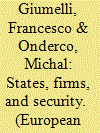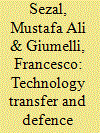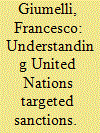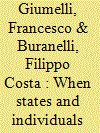|
|
|
Sort Order |
|
|
|
Items / Page
|
|
|
|
|
|
|
| Srl | Item |
| 1 |
ID:
142432


|
|
|
| 2 |
ID:
098808


|
|
|
|
|
| Publication |
2010.
|
| Summary/Abstract |
There is considerable debate on why are sanctions imposed, but little agreement so far. While the only consensus is that sanctions are aimed at changing the behaviour of a target, in fact, international sanctions can also be imposed to constrain actors or send signals. Since the creation of the Union in 1992, the EU has imposed 21 autonomous restrictive measures that are difficult to understand and compare without the proper analytical tools. The application of a tripartite taxonomy of the purpose of sanctions to the cases of the EU sanctions on Belarus, Zimbabwe and Uzbekistan is used to illustrate the differences and to set guidelines for a better understanding of international sanctions.
|
|
|
|
|
|
|
|
|
|
|
|
|
|
|
|
| 3 |
ID:
131102


|
|
|
|
|
| Publication |
2014.
|
| Summary/Abstract |
The increasing privatization of military and stability operations has received considerable scholarly attention. Existing scholarship, however, has largely focused on the privatization of state foreign policy, overlooking the empirical analysis of international organizations' use of commercial actors in the conduct of crisis management operations. The present study fills this gap by investigating the role of commercial contractors in supporting European Common Security and Defence civilian and military missions. By doing so, the article intends to advance the empirical knowledge of the privatization of foreign policy activities and the scope, determinants and future prospects of EU reliance on commercial actors for CSDP crisis management operations.
|
|
|
|
|
|
|
|
|
|
|
|
|
|
|
|
| 4 |
ID:
178502


|
|
|
|
|
| Summary/Abstract |
While the current practice of the United Nations Security Council, the European Union, and the United States leans towards imposing only targeted sanctions in most of the cases, private actors often complain about inability to process financial transactions, ship goods, or deliver services in countries where sanctions targets are located. The impact of sanctions often ends up being widespread and indiscriminate because sanctions are implemented by for-profit actors. This article investigates how for-profit actors relate to the imposition of sanctions, how they reflect them in their decisions, and how they interact with the public authorities. The findings of our research show that for-profit actors, with the possible exception of the largest multinationals, do not engage with public authorities before the imposition of sanctions. The behaviour of for-profit actors in the implementation phase is in line with the assumption of firms and business as profit-maximisers. Weighting the profits from business against the costs of (non-)compliance and make the decisions that in their view maximise their profit. Indeed, de-risking seems to be the most common approach by the companies due to the uncertainties produced by the multiple and overlapping sanctions regimes imposed by the United Nations, the European Union, and the United States.
|
|
|
|
|
|
|
|
|
|
|
|
|
|
|
|
| 5 |
ID:
187501


|
|
|
|
|
| Summary/Abstract |
State defence and security policies rely mostly on their military capabilities. The latter are ensured through research and development (R&D) as well as procurement, which are subject to defence industry dynamics. Furthermore the defence sector is heavily dependent on public funds; the latter can be more easily allocated if related R&D has a spill-over effect on the civilian sector, creating the potential for a bigger and more globally (or regionally) integrated market. This article investigates, then, how technology moves, and whether defence sector innovations create spin-offs in the civilian sector in the Netherlands. We aim to provide an industry-centred perspective on defence sector dynamics and potentials. For this, the article attempts to answer the following questions: Are defence technologies transferred to the civilian sector? What lessons can be derived from the Dutch case? To address these research puzzles the article’s theoretical framework builds on the technology-transfer literature in analysing the case study of the Netherlands. The basis for this is 23 interviews with representatives of Dutch defence companies that were carried out both in a workshop and in one-to-one settings in May and June 2020.
|
|
|
|
|
|
|
|
|
|
|
|
|
|
|
|
| 6 |
ID:
142434


|
|
|
|
|
| Summary/Abstract |
United Nations sanctions have undergone profound transformations in the past two decades. In 1990, the UN Security Council imposed a general, comprehensive embargo on Iraq after its invasion of Kuwait. In 2015, there are 16 Sanctions Committees managing regimes that have little in common with the one imposed against Iraq in 1990. The measures imposed against Iraq were comprehensive, covering all goods coming in and out of the country, while sanctions imposed today are mostly against individuals, non-state entities and are more limited in scope. This article aims to provide empirical and systematic evidence of some of the distinctive qualities of UN targeted sanctions. The analysis identifies three distinctive characteristics of targeted sanctions. First, targeting individuals and non-state actors has permitted the use of sanctions in a wider range of crisis types. Second, the targets of sanctions are substantially different from comprehensive sanctions. Third, the form taken by sanctions is substantially different today from the trade embargoes imposed in the past. The author concludes that the Security Council should devote special attention to the designing and implementation phases of sanctions. The article makes use of the new database prepared by the Targeted Sanctions Consortium (TSC), which includes all cases of UN targeted sanctions.
|
|
|
|
|
|
|
|
|
|
|
|
|
|
|
|
| 7 |
ID:
172288


|
|
|
|
|
| Summary/Abstract |
Interaction between individuals and states is considered a distinctive character of domestic politics, while international politics is the ‘realm of states’. However, it is becoming more common to encounter loci where both states and individuals interact at the international level, such as in the cases of the Special Tribunals for Rwanda, Sierra Leone, Liberia and the Former Yugoslavia as well as the International Criminal Court (ICC). Within the International Relations (IR) theory panorama, one would expect the English School of International Relations (ES) to have the theoretical and analytical tools to conceptualize synergies between states and individuals, but this is not evident. This article asks, how does the interaction between individuals and states take place in the ES? We argue that this interaction takes place via ‘contact points’, defined as those international bodies that bring together states and non-state actors, be they individuals or groups, interacting on equal grounds in terms of rights and responsibilities towards each other. The notion of ‘contact point’ is developed inductively by focusing on the Office of the Ombudsperson to the Islamic State of Iraq and the Levant (ISIL; Da’esh) and Al-Qaida Sanctions Committee. This research has theoretical implications. We aim to refine, sharpen and advance both the ES’s theoretical and analytical architecture. The contribution we seek to make is one that will better equip ES scholars to conceptualize and analyse those secondary institutions that allow states and individuals to enjoy rights and duties equally. By so doing, we will make possible for the ES to provide a more fine-grained account for these synergies than other IR theories. The notion of ‘contact point’ does set a new agenda for the ES, since interactions between individuals and states are likely to become a constitutive essence of world politics.
|
|
|
|
|
|
|
|
|
|
|
|
|
|
|
|
| 8 |
ID:
178611


|
|
|
|
|
| Summary/Abstract |
The decisions to impose sanctions on Russia and to lift them on Iran, in opposition to the wishes of the United States, contributed to the elevation of the profile of the European Union among the main global actors in international politics. However, the EU imposes sanctions since the spring of 1994, shortly after the entry into force of the Treaty of Maastricht. Even though the EU consequently has 26 years of experience herewith, EU sanctions have been mostly studied only on a case-by-case basis. The aim of this article is to provide an up-to-date and comprehensive overview of the experience of the EU with sanctions. Specifically, it presents the results of a newly constructed database of EU autonomous sanctions constituted by 48 cases of these restrictive measures, which have been subdivided in 85 episodes. The analysis revolves around four questions that we asked in each case: when sanctions were in force, what type(s) were used, where the targets were located and why restrictive measures were imposed. The analysis of the empirical database leads to observations about the EU as an international actor and, more generally, on the trends vis-à-vis the utilisation of sanctions as a foreign policy instrument.
|
|
|
|
|
|
|
|
|
|
|
|
|
|
|
|
|
|
|
|
|